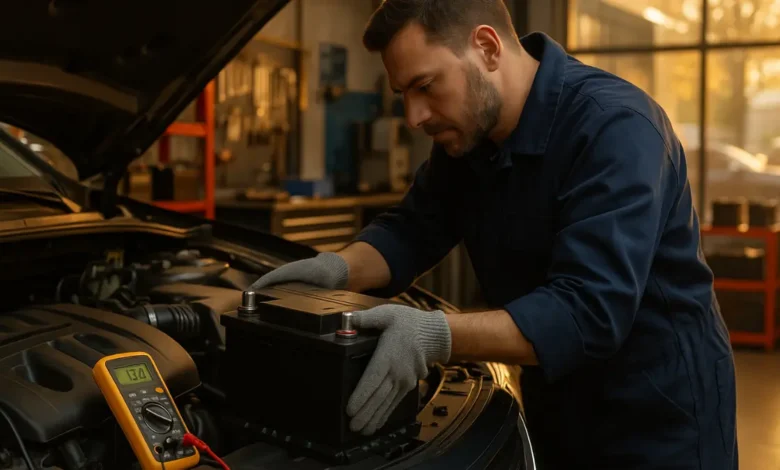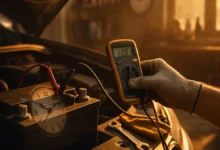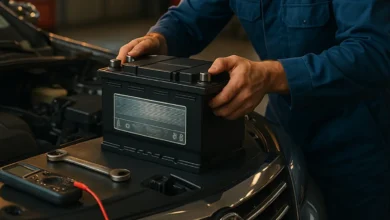Understanding Car Battery Replacement Cost and How to Get the Best Value

Learn everything about car battery replacement cost, what affects pricing, how to save money, and how to choose the best battery for your car. Expert insights in simple language.
Car Battery Replacement Cost Explained
When your car refuses to start or struggles on a cold morning, a weak or dead battery is often the culprit. Replacing it might seem simple, but understanding what goes into the car battery replacement cost can save you both stress and money. Many drivers are surprised to learn how much the price can vary from one shop to another. Factors such as your car model, battery type, labor fees, and warranty can all influence what you pay.
Knowing the real cost helps you make smarter choices. Instead of just accepting whatever a mechanic quotes, you can compare options and understand exactly where your money is going. Let’s break it down in a friendly, expert way so you’ll never be caught off guard by your next car battery replacement bill.
What Car Battery Replacement Cost Really Means
When people talk about the cost of car battery replacement, they usually refer to the complete expense of buying and installing a new battery. It’s not just about the price of the battery itself. The total often includes the battery unit, labor charges, shop fees, and taxes.
Some repair centers even charge for recycling the old battery, which is necessary for environmental reasons. So while the battery alone might cost one amount, the overall bill can be higher once installation and service are factored in. Understanding this breakdown will help you see why prices vary so widely between shops or dealerships.
Factors That Affect Car Battery Replacement Cost
Many things determine how much you’ll spend replacing a car battery. These aren’t just random numbers — they depend on real aspects of your vehicle and your location.
Battery Type and Quality
The kind of battery your car uses plays a huge role in the final cost. Standard lead-acid batteries are the most affordable and commonly found in most cars. Absorbent Glass Mat (AGM) batteries are more advanced, offering better performance and durability, but they come with a higher price tag.
Some newer or luxury cars require premium batteries that can handle advanced electrical systems. While these cost more initially, they tend to last longer and perform better in extreme weather. In short, the better the quality, the higher the cost — but also the greater the reliability.
Battery Size and Power Rating
Not all batteries are the same size or strength. Bigger engines and vehicles with more electronic features require more powerful batteries. The larger the capacity and the higher the cold cranking amps (CCA), the more you’ll pay.
In addition, certain cars need uniquely shaped or specialized batteries, which can be harder to find and therefore more expensive. Always match your battery’s size and rating to the manufacturer’s recommendation for best results.
Brand Reputation and Warranty
Brands with a reputation for long-lasting performance usually charge more. However, these reputable brands often offer longer warranties, which can protect you from early battery failure. Paying a little extra upfront can save you from another replacement too soon.
Cheap or no-name batteries may seem like a bargain, but they can wear out quickly and end up costing more over time. It’s wise to balance cost with quality and choose a trusted name that stands behind its product.
Labor and Installation Charges
Even if you buy the battery yourself, installing it can add extra costs. Labor prices vary depending on the shop and how difficult it is to access your car’s battery. In some vehicles, replacing a battery is as easy as loosening a few bolts, while in others, you might need to remove panels or reprogram systems.
Labor costs can also rise if your car requires special tools or battery registration after installation. This registration ensures that your vehicle’s computer system recognizes the new battery properly.
Location and Market Conditions
Where you live can make a surprising difference. In urban or high-cost areas, mechanics tend to charge more for both parts and labor. In smaller towns or rural locations, prices are often lower. Seasonal demand also plays a part. During winter, for example, when more batteries fail, prices can climb due to higher demand.
Another factor is market supply. When raw material costs rise or shipping delays occur, prices naturally increase. Understanding these fluctuations helps you decide when it’s best to buy or replace.
Typical Car Battery Replacement Price Range
While prices differ, there are general ranges that can guide your expectations.
For most compact or mid-sized vehicles using standard batteries, the total replacement cost usually falls within the affordable range. That includes the cost of the battery and basic installation. For cars that use AGM or specialty batteries, prices rise significantly due to the advanced technology and higher power demands.
Luxury cars, sports vehicles, and those with complex electrical systems can cost even more. These models often require specialized batteries that may need extra time and skill to install. Hybrid and electric vehicles use completely different battery systems, which can be far more expensive — though those are typically replaced less often.
Signs You Need a Battery Replacement
You don’t want to wait until your car refuses to start before considering a new battery. Recognizing the early signs can save you from being stranded.
If your engine turns over slowly, your headlights appear dim, or your electronics act erratically, it’s often a sign that your battery is weakening. You may also notice corrosion on the terminals or need to jump-start your car more often.
When these issues appear, it’s smart to get your battery tested. Most auto shops can perform a free battery test that tells you whether you need a replacement soon.
How to Save Money on Car Battery Replacement
Replacing a car battery doesn’t have to drain your wallet. With a few smart moves, you can reduce costs while still getting quality.
First, compare prices from different sources. Local shops, dealerships, and online retailers often list batteries at varying prices. If you’re comfortable with basic car maintenance, you can save on labor by replacing the battery yourself.
You can also look for promotions, rebates, or loyalty discounts from automotive stores. Many brands offer free installation when you buy directly from them. Returning your old battery can also earn you a small refund through a core charge credit.
DIY Versus Professional Replacement
Deciding whether to replace your battery yourself or hire a professional depends on your comfort level and your vehicle type.
Doing it yourself is cheaper and straightforward for most cars. You’ll just need basic tools and safety gear. However, in vehicles where the battery is hard to reach or requires electronic programming, professional help is safer.
Here’s a quick comparison:
| Option | Pros | Cons |
|---|---|---|
| DIY Replacement | Saves money, convenient, quick | Risk of incorrect installation, no warranty on labor |
| Professional Service | Expert handling, warranty on work, diagnostic check | Higher cost, appointment needed |
If your car includes advanced electrical systems, paying a professional ensures proper installation and prevents accidental damage.
Extending Your Battery’s Lifespan
You can stretch the life of your car battery by maintaining it properly. Start by keeping the terminals clean and checking for corrosion. Dirt and grime can cause power loss or prevent proper charging.
Avoid leaving electronics running when the engine is off, especially lights or charging ports. Extreme temperatures also affect battery life, so try to park in a garage or shaded area when possible.
Regularly check your charging system to make sure it’s not overcharging or undercharging the battery. Small maintenance habits can add months — even years — to your battery’s life.
Common Myths About Car Battery Replacement Cost
Many drivers believe that the most expensive battery automatically lasts the longest. While price often indicates quality, it doesn’t guarantee performance. Choosing the right battery type for your vehicle is more important than paying top dollar.
Another myth is that all car batteries are the same. In reality, every car model has unique electrical demands, and using the wrong battery can lead to premature wear or system issues.
Finally, some assume that replacing the battery will instantly fix all electrical problems. While it helps, certain issues like alternator faults or wiring problems may persist even after a new battery is installed.
Expert Tips for Choosing the Right Battery
Choosing a new battery isn’t just about picking the cheapest or most popular option. You need one that matches your car’s power needs, climate, and driving habits.
Check your owner’s manual for the recommended specifications. Look at the battery’s reserve capacity and cold cranking amps, especially if you live in cold regions. Also, consider warranty coverage and brand reliability — these factors often reflect long-term performance.
If you’re unsure, consult a trusted mechanic who can recommend a suitable option for your specific model. The right choice will give you peace of mind and reduce the chances of another early replacement.
Frequently Asked Questions
What is the average cost of a car battery replacement?
It varies depending on the vehicle, battery type, and labor charges, but most standard replacements fall in a moderate price range for parts and installation combined.
How long does a car battery last?
Most last three to five years, though climate, driving habits, and maintenance can extend or shorten this lifespan.
Can I replace my car battery myself?
Yes, if your car allows easy access and you have basic tools. However, modern vehicles with complex electrical systems are best handled by professionals.
Does warranty affect car battery replacement cost?
Yes, batteries with longer warranties cost more initially, but they offer better protection and long-term value.
Why does battery cost vary between shops?
Prices differ due to labor rates, battery brands, and shop markups. Comparing quotes before replacing your battery is always a good idea.
Conclusion
Car battery replacement cost doesn’t have to be confusing. Once you understand the factors that affect pricing — from battery type and quality to labor and location — you can make informed choices that save money and time. A healthy battery is vital for your vehicle’s reliability, and investing wisely ensures smooth, stress-free driving every day.
Keep an eye on signs of wear, maintain your battery properly, and shop smart when replacement time comes. With the right approach, you’ll get maximum performance and value from your car battery.





